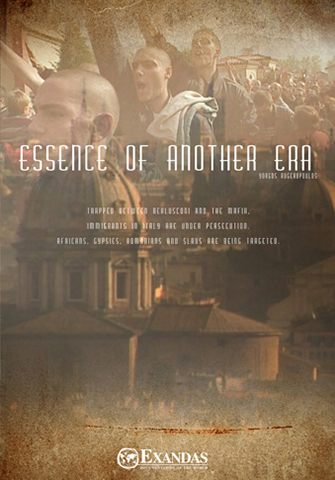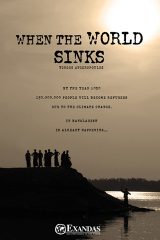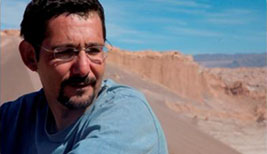
Essence of Another Era
Dir: Yorgos AvgeropoulosTrapped between Berlusconi and the Mafia, immigrants in Italy are under persecution. Africans, gypsies, Romanians and Slavs are being targeted. “Outraged citizens” are shooting at Africans, gypsy settlements are being burnt down by the angry mob, Camorra hitmen are shooting black people with no distinction and the city streets are being patrolled by “vigilante” groups in accord with the new anti-immigration law.
“There has been another moment in Italian history when they country’s security was commended to people who walked the streets wearing shirts of the same color”, says an emasculated left, making clear allusions to Mussolini’s Blackshirts. At the same time, Berlusconi’s Minister of Defense praises the bravery of the soldiers of the fascist regime, and Gianni Alemanno, once a member of a neo-fascist party, is elected mayor of the Eternal City.
Where is Italy heading?
Watch the Film Now!
Choose the language you prefer and stream the film in Full HD from any digital device. Enjoy your private screening!
Buy the DVD
€9,99
Public Screening
Are you interested in organizing a public screening of our film? Send us an email with your inquiry and we will be glad to assist you!
Educational / Library Use
Are you interested in enriching the library of your institution with our film? Contact us and let's create together an informed public!
- DURATION: 50min
- AVAILABLE IN THE FOLLOWING LANGUAGES: English | Greek
- AVAILABLE VERSIONS: English (50min) | Greek (50min)
- YEAR OF PRODUCTION: 2010
- Written & Directed by: Yorgos Avgeropoulos
- Produced by: Aggelos Athanasopoulos
- Director of Photography: Alexis Barzos
- Production Manager: Anastasia Skoubri
- Editing: Yiannis Biliris, Anna Prokou
- Original music: Yiannis Paxevanis
- Graphics: Sakis Palpanas
PRODUCTION NOTES
“It is my belief that today’s economic crisis is favoring the return of Fascism, just as it occurred with the 1929 world economic crisis. In Italy, we have moderate fascists like Berlusconi. If given the chance, many members of Berlusconi’s entourage would choose Fascism over a democratic revolution. Berlusconi is lucky because he is not being judged by his actions, but rather on the basis of publicity and glamour. Wherever he goes, the masses follow, just as they followed Mussolini”.
Giorgio Moca, Fighter in the anti-fascist struggle during World War II.
During the first days of 2010, Italy was once again shaken by yet another outbreak of racist violence. In Rosarno, Calabria, unknown shooters attacked African immigrants with air guns when they were returning from work. The reason was unimportant, as a resident of Rosarno describes: “Some black man was relieving himself on the street and a lady came out on the balcony and started calling him a pig and an animal.
Then her husband came out and shot him with the air gun, injuring him in the hand”. And he adds in indignation: “They’re always urinating in the street. They’re uncivilized”. This incident resulted in the insurrection of the 3,000 African seasonal workers living in Rosarno, for it was not the first time they had been under attack. In 2008, unknown perpetrators used their rifles against two immigrants who were sleeping, sending them to hospital.
Back then, the immigrants had marched pacifically in the center of this town of 15,000 inhabitants, asking to be treated humanely. This time they set up barricades and broke everything that stood in their way, before being pushed away by the police. Are Italians racists? Surely not all. However, a significant share of the society, especially from the poor, popular classes, has been “educated” for years by Berlusconi’s media empire to view the immigrant as a competitor and a potential delinquent. Lega Nord and Alleanza Nationale, the far-right parties who support the Berlusconi government, did not lose this opportunity to promptly promote their xenophobic agenda, bringing forward and ratifying a series of draconian laws on immigration and security.
“Instead of a specific number that we can absorb every year, there is a huge amount of immigrants entering the country who, not being able to find a job, turn without fail to crime”, Silvio Berlusconi loudly proclaims. “We cannot accept walking in our cities and getting the impression that we are not in Europe, but in Africa! We shall not put up with this!” “You want to turn Italy into a racist, xenophobic and fascist country”, the opposition protests, only to receive the reply of the far-right representatives: “We are not looking out for the safety of the rich, but for that of the poor, who no longer vote for you but for us!”
The Bossi-Fini anti-immigration law penalizes immigration and illegal entrance to the country. It includes the incarceration of Italians aiding or employing illegal immigrants and the collection of fingerprints from gypsy children. It also creates “vigilante” groups, that is groups of volunteers that patrol the neighborhoods and “assist the police in their work”. “What is going on?” a woman asks as she sees a group of ten people with dogs walking the streets of her neighborhood. “We are patrolling for immigrants”, replies Mario Borghezio, a member of the European Parliament for extreme-right party Lega Nord, who very often leads the “ronde”. “It was about time!” the woman answers, relieved. “Yes, our presence will be felt”, Mr Borghezio asserts, and starts shouting at an immigrant sitting in the park nearby: “Get out of here you junkie! This park is for respectable citizens and not for bums!”
Gypsies suffer a proper pogrom. The rumor of a 14-year-old gypsy girl trying to steal the baby of an Italian woman was enough for four Roma settlements near Naples to be burnt-down within hours. The unidentified attackers were throwing Molotov bombs from motorbikes, as the gypsies ran for their lives and the police simply watched. The majority of the 3.5 million immigrants living in Italy work in the fields and construction sites of the South.
In the areas of the Camorra and the Ndrangheta, the powerful mafia organizations whose activity was unveiled by journalist Roberto Saviano in his book, Gomorra. “The Italians do not see the activities of the Ndrangheta or the Camorra, while the murders are numerous. During the past 30 years and in this province alone, 4,000 people have been killed. These are numbers which are only comparable to figures coming from the Gaza Strip…”, says the reporter, who lives under permanent police protection and changes his residence regularly, due to a price put on his head by organized crime. “The Mafia brought many Africans to these areas. To work like animals. If they do not accept the starvation wages and whatever else the Mafias impose on them, they suffer the consequences.
This is what happened in Castel Volturno during the autumn of 2008. Camorra hitmen shot down all Africans standing outside a tailor shop. Castel Volturno is notorious for its drug dealing, controlled by the Nigerian Mafia. However, not one of the 8 people killed had any relation with the drug trafficking or with Nigeria. It was a clear message to all the African community of that area and it resulted in immigrant riots. “They are the only ones who can still react”, Roberto Saviano says. “They are the hope of Italy. Because, today, Omertá is not to know and remain silent. It is to not know, to not be informed, to keep one’s eyes closed.”







